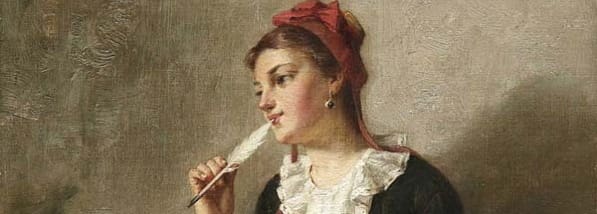Dear Father John, I have felt a great desire to enter religious life for a few years now, but keep hitting an invisible wall so-to-speak. After attempting the Spiritual Exercises of St. Ignatius, the Lord helped me to see that I am not ‘indifferent’ and have to  rebuild my foundation of a personal relationship with Him. In particular He helped me see my utter inability to surrender stemming from a lack of trust. Unfortunately, due to my lived experience of past hurts, I find myself unable to trust anyone, relying only on myself which is then projected onto God and I feel utterly stuck. I feel as though trust requires gratitude, but gratitude requires humility and being humble, seeing and accepting my weakness is utterly impossible when you have established a pattern of trusting only in yourself and so it is an endless cycle.
rebuild my foundation of a personal relationship with Him. In particular He helped me see my utter inability to surrender stemming from a lack of trust. Unfortunately, due to my lived experience of past hurts, I find myself unable to trust anyone, relying only on myself which is then projected onto God and I feel utterly stuck. I feel as though trust requires gratitude, but gratitude requires humility and being humble, seeing and accepting my weakness is utterly impossible when you have established a pattern of trusting only in yourself and so it is an endless cycle.
Where does one go from here? How does one learn to trust, to be grateful when you only see the failures and hurts in life, how does one surrender and become humble? Is it all a pure gift from God, or is there more I can do on
my end as I have been begging for these graces for years to no avail?
Thank you for your wonderful blog which has been very fruitful!
Reading this question gives me deep joy. The grace you have already received is so beautiful! I mean, the grace of understanding the core of the spiritual life (trust) and your need for deep, spiritual rehabilitation in that area. God has been speaking his wisdom to your soul!! You actually bring up at least three separate but related issues. I will comment briefly on them one by one.
Trust: The Heart of Holiness
First, and most importantly, you bring up the issue of trust. However much of the Spiritual Exercises you completed, you can be sure that it was fruitful. The Exercises allow us to confront in a powerfully intimate and personal way the fundamental, universal truths of the spiritual life. The universal truth that struck you the most is the very core of the Christian journey: the need for trust. Sin separates us and distances us from God. All sin – our own personal sins as well as the sins of others, both of which damage our souls – traces its origin back to the Fall of Adam and Eve (that’s why their sin is called “original sin”). What was the essence, the deepest core of their sin? We tend to think it was disobedience. Think again. You see, that disobedience was the trunk, but it grew out of an ever deeper root. Here’s how the Catechism puts it (#397):
Man, tempted by the devil, let his trust in his Creator die in his heart and, abusing his freedom, disobeyed God’s command. This is what man’s first sin consisted of. All subsequent sin would be disobedience toward God and lack of trust in his goodness [emphasis added].
So rehabilitating trust in God is not only YOUR primary project for growth in holiness, but it is EVERY CHRISTIAN’S primary project! That’s not to belittle your journey. Your experiences in life, good and bad, have damaged your capacity to trust in God in a personal, unique way. Your mission in life, your vocation, your way of knowing, loving and serving God is also personal and unique. And so, the path you take to rehabilitate your trust in God will have certain twists and turns, certain epiphanies and setbacks, that will be entirely your own. But, in the end, re-learning to trust God is for each one of us the central, defining spiritual project.
What To Do?
Now we are ready to face the second issue you bring up: “Where does one go from here?” I detect frustration in your question. That’s totally understandable – but it’s also an indicator that something is askew. I think it has to do with expectations. You are wondering how you can develop trust when you don’t have much. You are wondering how to develop gratitude when you don’t have humility. You are wondering how to develop humility when you have formed such a strong and deep pattern of self-reliance.
Let me answer your question with a question. Let’s pretend you don’t know how to play tennis, but you decide that you want to learn. How do you do it? How do you go from zero to beginner to intermediate to advanced? How do you develop the physical skills and coordination and muscle memory necessary for tennis, when you have none of those things? The answer, I think you will agree, is fairly simple. You learn to play tennis by playing tennis.
Holy Tennis
Growth in virtue (trust, confidence in God, surrender, humility, and gratitude) is similar. Virtues are moral habits, just as like skills are physical habits. They are developed under two conditions. First, we need to have the raw material. Future tennis players have to have the normal use of all the major muscle groups (you can’t play tennis without arms). Future saints have to have the normal use of human nature: “heart, soul, mind, and strength” as our Lord put it (Luke 10:27). From your question, it is clear that you have the raw material. Now you just need to begin to put it into action. Virtues are not developed “once and for all.” We can never check a virtue off our “to-do” list. We grow in trust, little by little, by trusting. We grow in humility, little by little, by exercising self-denial. We grow in gratitude, little by little, by saying thank you, sincerely and intentionally, over and over again, especially when we don’t feel like it. The sacraments nourish these efforts; prayer and spiritual reading/study informs and enlightens these efforts; the Holy Spirit – directly, through a spiritual director or mentor, through faith-based friendships, and through God’s Providence – will coach you.
St. John of the Cross put it succinctly when writing about the virtue of love (which is the core of every virtue, so it applies equally to trust, humility, gratitude…): “Where there is no love, put love, and you will find love.”
As long as you are patient, even the tiniest effort to trust God will give God’s grace a chance to touch your soul and strengthen the very trust that you are using. Remember, at Baptism you received sanctifying grace and the gifts of the Holy Spirit, and at Confirmation you received a strengthening of them. God is already at work in your life. He is drawing you closer to him. The journey will take your whole life, so don’t think that you have to make yourself perfect before God can do anything with you. On the contrary! God is already working in and through your life! Your desire to know and follow him better is already a clear sign that you are growing!
Two Time-Tested Trust Workouts
On a practical level, the saints all agree on two spiritual exercises that directly strengthen our capacity to trust God.
First, meditating on Christ’s Passion. As we gaze on Christ “loving us to the end” (John 13:1), our fears are quelled and we realize, gradually, that even though everyone else may have betrayed us and wounded us and lost their trustworthiness, Christ will never betray us. He is worthy of our trust. No matter what happens, he will keep on loving us. That’s one of the core messages of the Passion. On this point, I would greatly encourage you to watch The Passion of the Christ, and go through it gradually, using Inside the Passion as a kind of study guide, or guide for meditating on this central mystery of our faith.
Second, focus on discovering and embracing God’s will in the nitty-gritty of your daily life. We know what God’s will is through his Commandments, through the teachings of the Church, through the duties of our state in life, and through the circumstances of God’s Providence. Lord, what do you want me to do right now? That question, that prayer, is a powerful ally in your path of growing trust. Because every time we accept and embrace, and try to fulfill, God’s will, even with a fragile love and flimsy faith, we are actually exercising our trust in God. We are saying, “Okay Lord, I don’t really understand this completely, but I know that you want me to do it, so here goes…” That counts for simple tasks like washing the dishes. And it counts for more daunting tasks like talking about the faith or defending a Catholic position in a conversation at work. This is especially true when God’s will contradicts our natural preferences. That’s when we get to carry our own crosses, which is the privileged place for exercising, and therefore growing in, our trust in God.
We have done some related posts on these issues that you may want to read or re-read: a two-part post on trusting in God, and a two-part post on discerning God’s will. If you keep those elements in play, you can be sure that you are making progress, regardless of how you may feel at any given moment.
Follow Your Call!!!
Finally, you mention at the beginning of your post that your trust issues have been “an invisible wall” in following what may be a vocation to the religious life. That may be a ruse of the devil. Being holy is not a requirement for entering religious life. In fact, a religious vocation, like any vocation, is actually, first and foremost, a specific path for growth in holiness. If your heart quickens at the thought of entering religious or consecrated life, you should act on it now. Visit religious congregations; speak with consecrated persons; keep taking whatever next step God puts in your mind until you discover your path. Don’t rush, but don’t delay! Maybe a good next step would be to finish the Spiritual Exercises retreat that you started (you mentioned that you “attempted” to do the Exercises – sounds like you didn’t finish!). If you like that idea, I can highly recommend my confreres’ who preach Spiritual Exercises Retreats here. In any case, if God has put that question in your heart, you can be sure that doing what you can to answer that question will help put you on the fast track to greater intimacy with him, and that’s what it’s all about.
God bless you!


